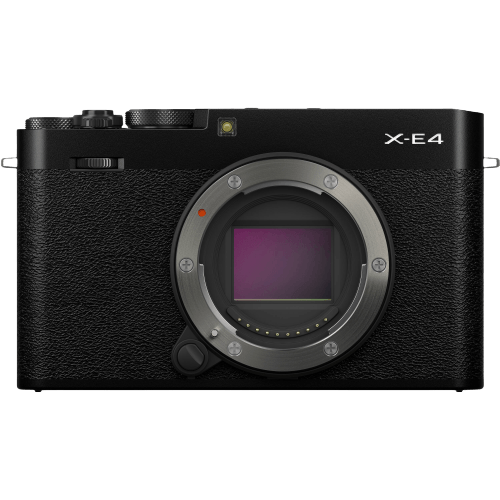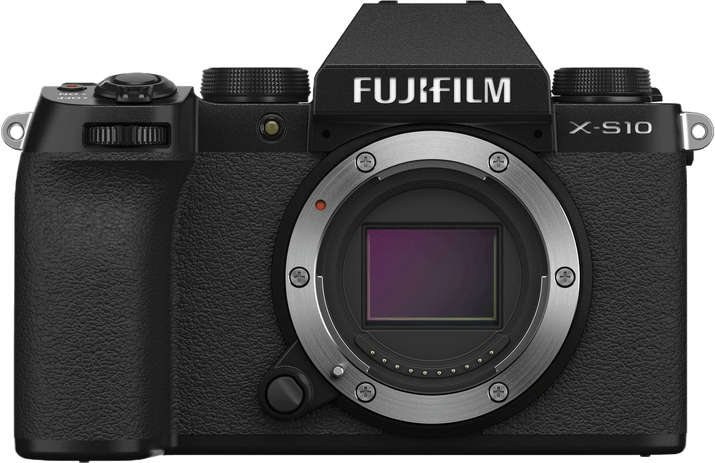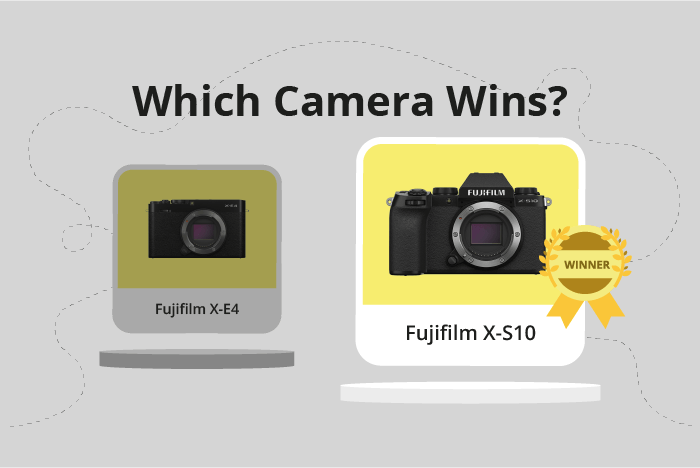Fujifilm X-E4 vs X-S10 Comparison
Fujifilm X-E4

Fujifilm X-S10

The Fujifilm X-S10 takes the lead with a score of 69/100, while the Fujifilm X-E4 trails slightly behind at 66/100. Both cameras are mirrorless and were released close to each other, with the X-E4 being announced on 01/27/2021 and the X-S10 on 10/15/2020. They share similar traits, including their camera type and release year.
The X-S10 has an edge with its higher score and is priced at $999, while the X-E4 comes in at a lower price of $849. However, the X-E4 is more compact and lightweight, measuring 121 x 73 x 33mm and weighing 364g, compared to the X-S10’s 126 x 85 x 65mm and 465g.
Each camera has its advantages: the X-S10 offers better performance, while the X-E4 is more affordable and portable. Ultimately, the choice depends on the user’s priorities and preferences.
Fujifilm X-E4 vs X-S10 Overview and Optics
The Fujifilm X-S10 emerges as the winner in the optics comparison with a score of 72/100, while the Fujifilm X-E4 follows closely with a score of 67/100. Both cameras share several common specifications, including a 26-megapixel CMOS sensor, 20 fps shooting speed, X-Processor 4, APS-C sensor size, and a Fujifilm X lens mount.
The Fujifilm X-S10 outshines the X-E4 mainly due to its image stabilization feature. This essential feature allows photographers to capture sharp images and steady videos, even in challenging low-light conditions or while using slow shutter speeds. The absence of image stabilization in the X-E4 makes it less versatile for various shooting scenarios, especially for users who rely on handheld photography.
While the Fujifilm X-E4 may not surpass the X-S10 in terms of optics, it still offers impressive performance with its shared specifications. The 26-megapixel CMOS sensor, 20 fps shooting speed, and X-Processor 4 ensure that both cameras deliver excellent image quality, fast performance, and a wide range of compatible lenses with the Fujifilm X lens mount.
To sum up, the Fujifilm X-S10 holds an advantage over the X-E4 with its image stabilization feature, which makes it a more versatile choice for photographers. The X-E4, on the other hand, still provides impressive performance and image quality, making it a solid option for those who can manage without image stabilization. Ultimately, the choice between these two cameras will depend on the individual user’s needs and preferences.
Fujifilm X-E4 vs X-S10 Video Performance
The Fujifilm X-E4 and Fujifilm X-S10 tie in video capabilities, each scoring 91 out of 100. Both cameras share several essential video specifications, making them equally competitive in this category.
The common video specs between the X-E4 and X-S10 include a maximum video resolution of 4K, maximum video dimensions of 4096 x 2160, and a maximum video frame rate of 240fps. Additionally, both cameras have built-in time-lapse functionality. These shared features indicate that both cameras are highly capable of delivering high-quality video content.
While the X-E4 and X-S10 share the same video score, there may be some differences in their video performance due to their unique features. However, the information provided does not offer any specific advantages for either camera in this area.
In terms of video capabilities, both the Fujifilm X-E4 and Fujifilm X-S10 are strong contenders. Their shared specifications make them equally suitable for various video projects and applications. Users should consider other factors, such as ergonomics, design, and additional features, to determine which camera best suits their needs. With equal video scores and capabilities, both the X-E4 and X-S10 are excellent choices for those looking to capture high-quality video content.
Fujifilm X-E4 vs X-S10 Features and Benefits
The Fujifilm X-E4 wins the features comparison with a score of 72/100, while the Fujifilm X-S10 obtains a score of 70/100. Both cameras share some common specifications, such as a 3-inch screen size, touchscreen capabilities, flip screen functionality, lack of GPS, and the presence of Bluetooth connectivity.
The X-E4 stands out with a higher screen resolution of 1,620,000 dots, which provides a clearer and sharper display for users. Moreover, it offers Wi-Fi connectivity, making it easier for photographers to transfer images and control the camera remotely through a smartphone or tablet.
On the other hand, the X-S10 has a lower screen resolution of 1,040,000 dots, which does not offer as clear a display as the X-E4. Additionally, it lacks Wi-Fi connectivity, making it less convenient for users who require on-the-go image sharing and remote camera control.
Despite the lower score, the X-S10 still provides a reliable camera experience with its touchscreen and flip screen features, as well as Bluetooth connectivity. However, the X-E4’s superior screen resolution and Wi-Fi capabilities make it a more advanced option in terms of features.
Considering the comparison of features, the Fujifilm X-E4 offers a better user experience with its higher screen resolution and Wi-Fi connectivity. Although the X-S10 falls short in these aspects, it remains a decent choice for those who prioritize touchscreen functionality, flip screens, and Bluetooth connectivity. Ultimately, users should weigh their specific needs and preferences when choosing between these two cameras.
Fujifilm X-E4 vs X-S10 Storage and Battery
The Fujifilm X-E4 and X-S10 share an identical storage and battery score of 35/100. Both cameras have one memory card slot and accept SD, SDHC, and SDXC cards with UHS-I compatibility. They also support USB charging, making it convenient for users to charge on-the-go.
The X-E4 performs better in terms of battery life, providing 380 shots per charge with its NP-W126S battery. This is an advantage for those who need longer shooting sessions without worrying about battery depletion.
On the other hand, the X-S10 has a slightly lower battery life of 325 shots per charge, using the NP-126S battery. While this difference may not be significant for casual users, it could be a deciding factor for those who require extended battery performance.
Both cameras have their merits in storage and battery aspects. The X-E4 offers better battery life, while the X-S10 provides similar storage capabilities. Ultimately, the choice depends on individual preferences and requirements.
Fujifilm X-E4 vs X-S10 – Our Verdict
Are you still undecided about which camera is right for you? Have a look at these popular comparisons that feature the Fujifilm X-E4 or the Fujifilm X-S10:

